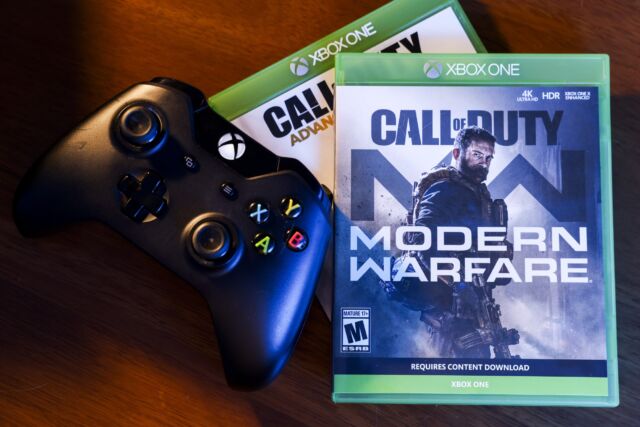Sony worries Microsoft will only give it a “degraded” Call of Duty

Late last month, UK regulators said they no longer believed a proposed Microsoft-owned Activision would bar Call of Duty games from PlayStation platforms, a reversal of earlier preliminary findings. Even if you grant that premise, though, Sony says that it’s still worried Microsoft could give PlayStation owners a “degraded” version of new Call of Duty games in an effort to make the Xbox versions look better.
“Simply… making it as good as it could be”
In a newly published response to the UK’s Competition and Markets Authority, Sony says the regulators’ recent turnaround is “surprising, unprecedented, and irrational.” The company takes specific issue with the regulators’ “lifetime value” modeling, which Sony says heavily undervalues what an Xbox-exclusive Call of Duty would be worth to Microsoft.
Beyond those technical concerns, though, Sony says it worries that Microsoft might subtly undermine PlayStation “simply by not making it as good as it could be.” That could include small changes to the game’s “performance [or] quality of play,” but also secondary moves to “raise [Call of Duty’s] price [on PlayStation], release the game at a later date, or make it available only on Game Pass.” Microsoft would also “have no incentive to make use of the advanced features in PlayStation not found in Xbox,” Sony says, an apparent reference to the PS5 controller’s advanced haptics and built-in audio capabilities.
In its own newly filed response, Microsoft reiterated that it has “no intention to withhold or degrade access to Call of Duty or any other Activision content on PlayStation.” That follows on a March filing where Microsoft promised Sony parity on Call of Duty’s “release date, content, features, upgrades, quality, and playability.”
But Sony’s response reflects a continued lack of trust in such promises. The company cites detailed analyses from the likes of Digital Foundry in saying that “the technical quality of Modern Warfare II was similar across platforms” in today’s market. After a merger, though, Sony argues that “Microsoft would have different incentives because degrading the experience on PlayStation would benefit Xbox, PlayStation’s ‘closest rival.'”
This kind of “partial foreclosure” strategy might “trigger fewer gamer complaints” than full Xbox exclusivity for Call of Duty, Sony says, while also allowing Microsoft to “still secure revenues from sales of Call of Duty on PlayStation for a transitional period.” But Sony says the long-term results of this kind of “degraded” PlayStation version would be the same as a full PlayStation ban: Call of Duty players abandoning Sony and moving to Microsoft’s platforms.
Such a move would “seriously damage our reputation,” Sony Interactive Entertainment CEO Jim Ryan told the CMA in a recent hearing. “Our gamers would desert our platform in droves and network effects would exacerbate the problem. Our business would never recover.”
“Attuned to quality”
This isn’t the first time Sony has expressed concerns over PlayStation getting a “worse” Call of Duty deal. In early March, Sony worried about the economic incentives of negotiating a Call of Duty licensing fee with a Microsoft-owned Activision. “Today, Activision is incentivized to reach an agreement with [Sony] to distribute Call of Duty,” the company wrote. After a merger, though, Microsoft-owned Activision “would benefit from a failure to distribute Call of Duty on PlayStation,” Sony said.
Sony also argued in March that these kinds of platform parity issues “could arise even without an active decision on the part of Microsoft to degrade Call of Duty on PlayStation.” For instance, Microsoft might be “incentivized to support and prioritize development of the Xbox version of the game, such as by using its best engineers and more of its resources.”

In its March update, the UK’s CMA said it found these kinds of arguments from Sony generally unpersuasive. “We have provisionally concluded that, although such strategies could degrade PlayStation’s offering to some extent, they would not materially affect its ability to compete,” the regulators said.
But Sony argues back that even a small difference in Call of Duty quality, availability, or price between the platforms could “quickly harm [Sony’s] reputation and cause a loss of engagement and of players.”
“It is difficult to conceive of an industry where consumers are more attuned to quality and where quality affects purchasing decisions,” Sony writes. “Call of Duty gamers are passionate, knowledgeable, and sophisticated. Gamers engage with each title in the franchise immediately after its release, are keenly aware of a game’s price, quality, and features, and regularly compare the quality, performance, and features of their favorite games across PlayStation and Xbox.”
We’ll see if those kinds of arguments are ultimately persuasive when the CMA releases its final report, which is due by the end of April.
https://arstechnica.com/?p=1929772